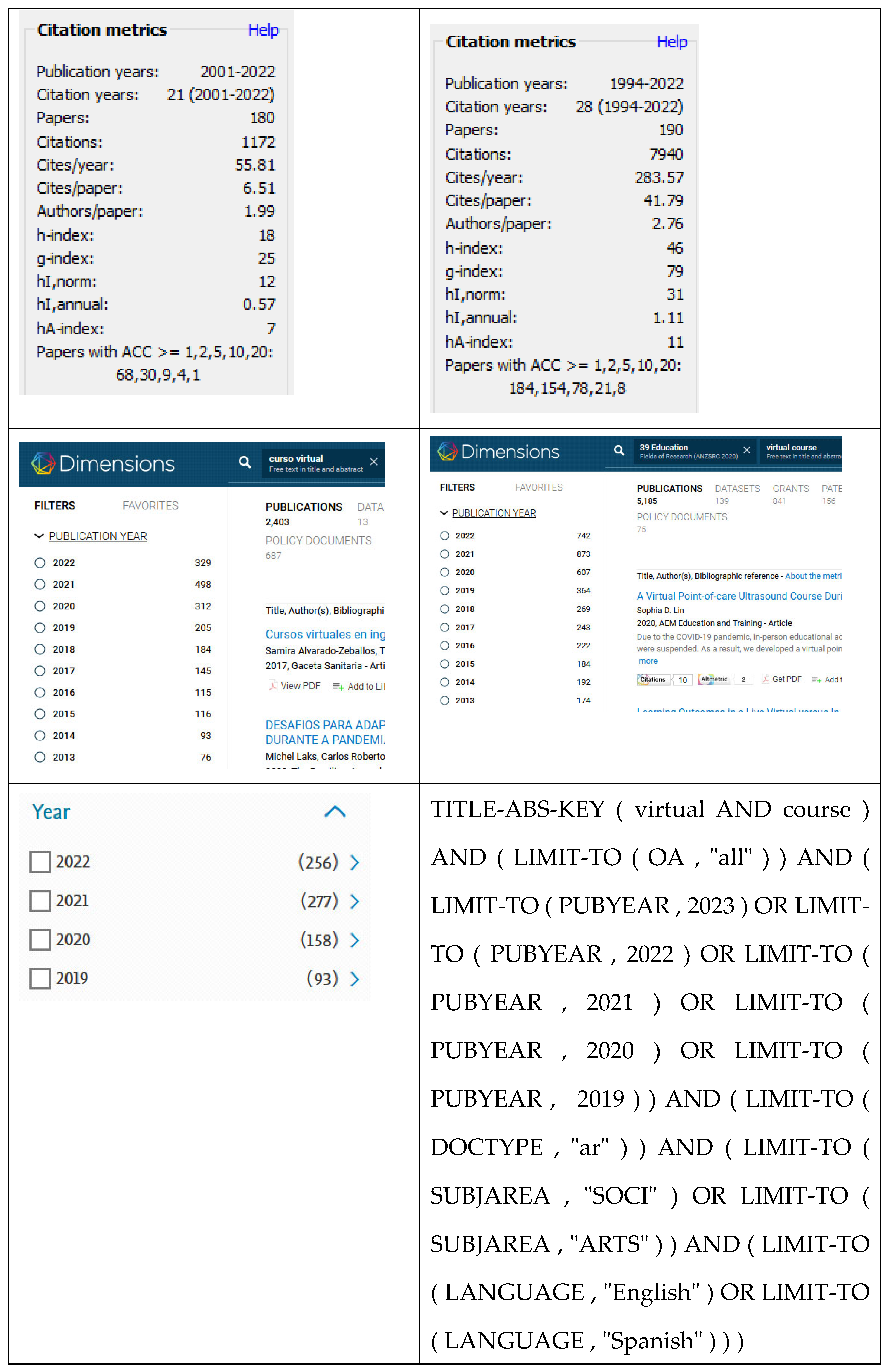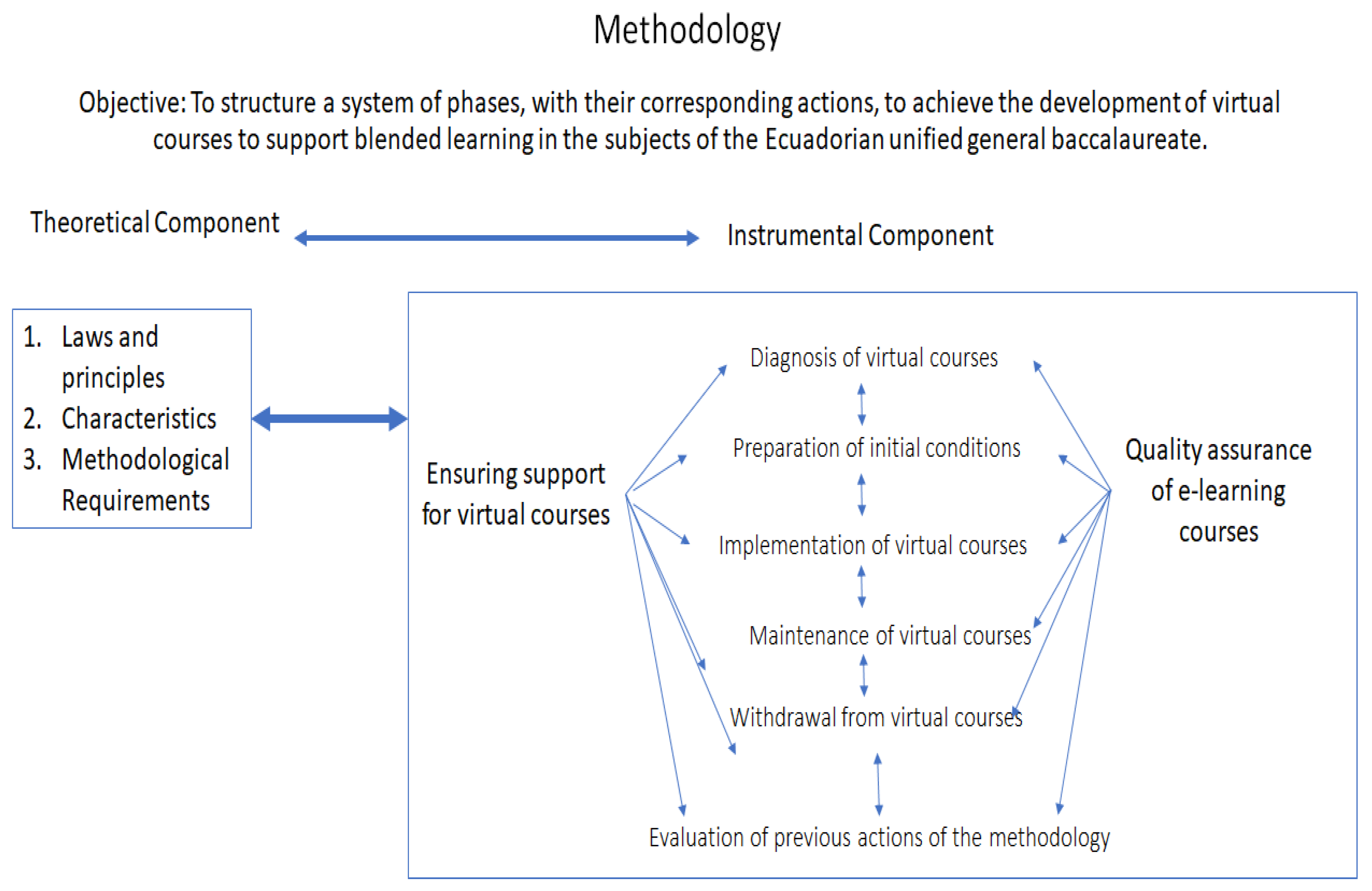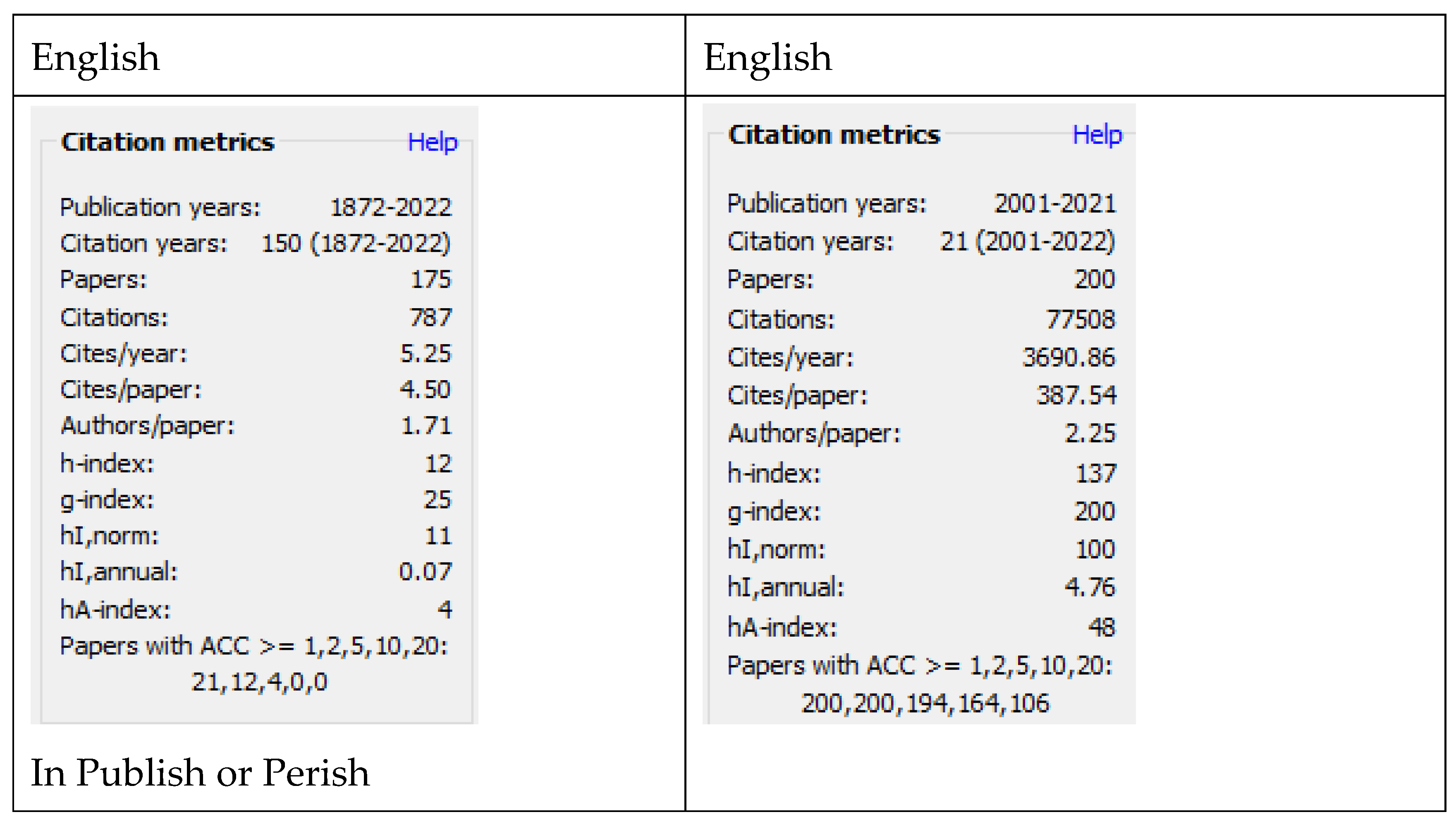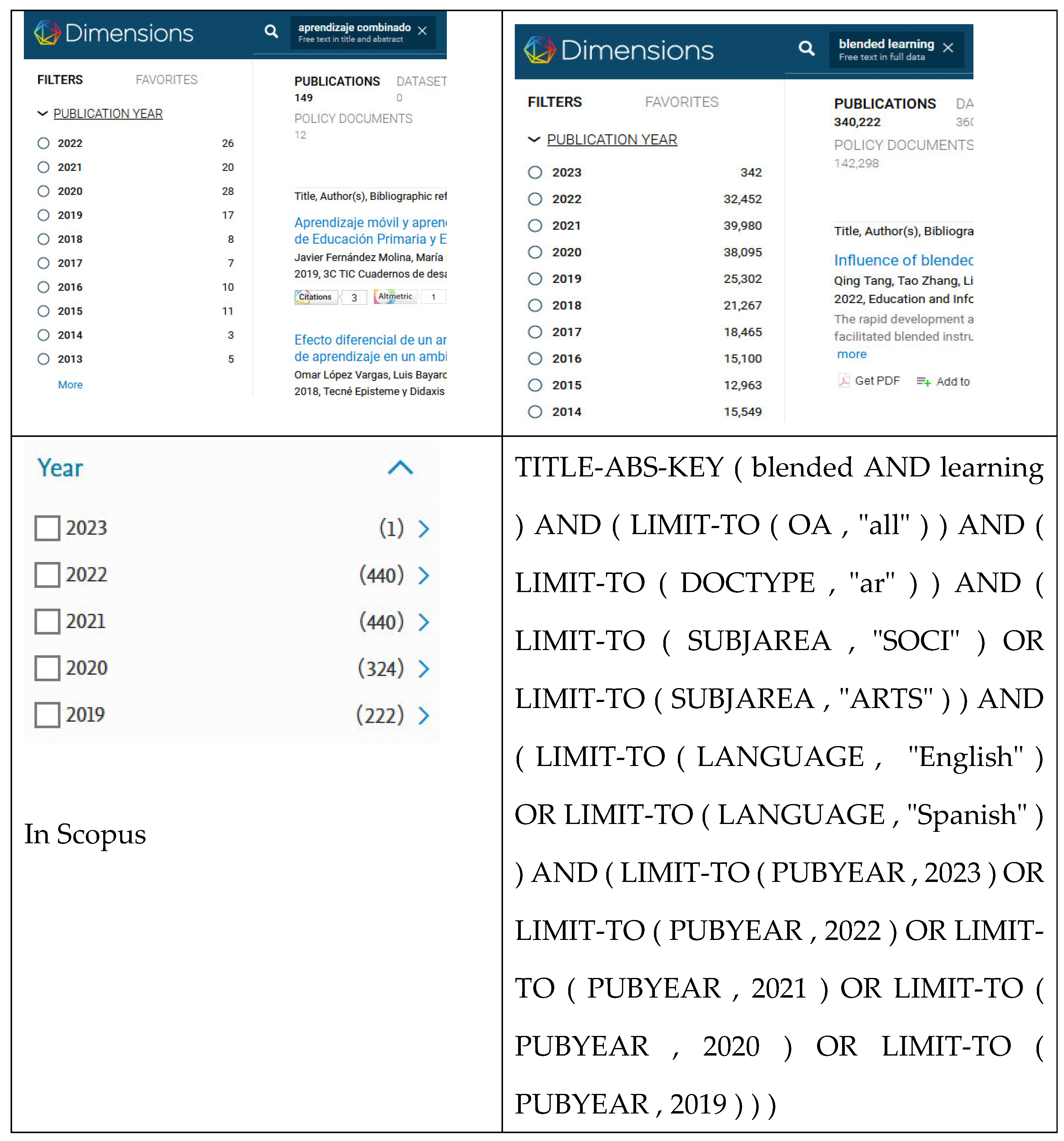Submitted:
21 September 2024
Posted:
24 September 2024
You are already at the latest version
Abstract
Keywords:
Introduction
- No system of phases and stages has been identified that would lead to the development of online courses for blended learning involving teachers.
- Existing models such as ASSURE, ADDIE, among others, are proposed for designing online courses and do not respond to blended learning.
- The digital teaching resources developed by teachers lack organisation to ensure that affective relationships are established between the personalised components of the teaching-learning process.
- The Web of Science and Scopus search engines do not detect papers that reveal avenues for developing courses for blended learning support outside the methodologies already analysed that should not be applied in the context of analysis.
Methodology and Materials
Results

Discussion
- Discussion about blended learning
- Enable students to select different learning routes allowing your curriculum to be flexible.
- Pre-eminence of independent study for students
- Develop an online environment with hypermedia interfaces that is pleasing to the eye by incorporating visual symbols that eliminate text as far as possible.
- Include didactic resources that promote autonomous student learning.
- Provide as many and as varied communication resources as possible between the personal components of the process.
- Enhance forms of formative assessment using periodic submission of assignments that increase their complexity during online learning.
- 2.
- Discussion about the development of online courses
- Didactic unit: deals with the more general elements that allow for the structuring of teaching processes that lead students' learning towards the proposed social objectives.
- Management units: these correspond to the organisational elements necessary for the virtual course to be properly financed.
- Technology units: this component includes all the electronic equipment and software to be used in such a way that they all come together in a software ecosystem, as well as the processes that lead to the maintenance of the platform that supports the virtual course.
- 3.
- Methodology to develop virtual courses

- Carrying out a diagnosis of students and teachers regarding the mastery of the computer tools that are used, technological devices and the educational needs of the students.
- Articulation between pedagogical, didactic, technological and organisational aspects in correspondence with the pedagogical model assumed in the blended learning.
- Planning and organisation of activities linked to the objectives of the course, the proposed methodology and the social representations that students and teachers have about learning, in a way that favours collaboration between students and with the teacher during blended learning and the mediating role of the teacher that guarantees its educational value.
- Use of computer tools to enhance communication in the development of the courses through this modality.
- Selection of learning resources to favour affordability in correspondence with the virtual environment, revealing educational potentials.
- Consider all forms and types of evaluation in every assessment process undertaken.
- Characterisation of the development of information competences in teachers and students to enable them to appropriate the technological resources necessary to develop digital didactic resources.
- Characterisation of the knowledge that teachers have about the contents that are taught in their teaching and that are found in the study plan.
- Elaboration of instruments to find out how teachers develop the development of virtual courses and the contents of their subject.
- Diagnosis of the software ecosystem of the institution: it is important to know the network architecture with its equipment and software that support the online course platforms, the speed of information transfer between the different channels, the levels of connectivity of the resources and how these are integrated to support the spaces must be diagnosed with load and stress tests.
- Diagnosis of teachers' knowledge of blended learning.
- Careful attention to the shortcomings and potentialities detected in order to build on the potentialities to eradicate the shortcomings.
- Development of workshops, seminars and meetings that allow teachers to socialise the contents of their subjects that each of them teaches in each group.
- Establish efficient communication mechanisms between teachers in the study of the tools and technologies to be used.
- Increasing actions aimed at relations between subjects by grouping teachers in teams by knowledge areas in such a way that no barriers are created in communication between them.
- Implementation of training actions for all human resources involved in the process so that they act in line with the needs of the context.
- Analysis of the files related to iterations of the methodology to detect shortcomings in the implementation of its actions and include them as study material for the teaching teams. Successful processes should also be included so that good practices are appropriated.
- Launching of requests for active participation from each teacher who will be allocated part of their time fund for this purpose.
- Elaboration of the contents that will form part of the digital teaching resources.
- Selection of the teaching units to be worked on and the teachers responsible for each one.
- Identification of the essential elements to ensure that courses developed on another platform can be introduced on one platform.
- Develop visual aspects to increase their presence in the e-learning course.
- Plan the scope of each digital didactic resource and the moments that are configured in blended learning based on the conditions of each student.
- Categorising one's own digital learning resources.
- Determine the experimental scope and the tutorial scope.
- Unwrap the views of each content that will be shown to users.
- Manage subject collectives to help teachers develop digital teaching resources with the system approach needed to restructure each virtual course and integrate it with the others.
- Manage in the access directory each of the spaces dedicated to each particular course and which can be managed by that teacher.
- Determine the routes for testing each course separately and all of them.
- The establishment of actions for the quality assurance of a digital learning resource should start from the moment of the request for its development until it is decided to withdraw it because it has become obsolete. The main criterion to be determined in this case is the fulfilment of the pedagogical objective for which it was created, as the rest of the components are subordinated to this.
- Application of empirical methods such as Iadov's technique to measure how much learners enjoy interacting with the courses.
- Organise the results of the application of the empirical methods by priorities to implement them in the online courses.
- Increasing digital learning resources to provide new learning opportunities for students.
- Establish ways to obtain student feedback on digital learning resources that have been improved or included to validate their relevance.
- Determination of curricular transformations and their impact on the online course.
- Determination of the level of change required and the changes needed.
- Identification of the best performing teachers who can address the necessary modifications.
- Introduce the modifications determined by the subject groups in conjunction with the person in charge of the virtual course on the platform.
- Apply empirical methods to find out how much pupils like working with the modifications made.
- Determination of the curricular transformations and the course(s) to be eliminated.
- Determination of the repercussions for the rest of the courses if one course is eliminated.
- Delete selected courses.
- Development of alternative systems: The impact should be duly documented using the templates of the software withdrawal. Next, the actions of this methodology should be started from stage two, generating a new increment in the configuration of digital didactic resources in the virtual course, which reaffirms the iterative and incremental character of this methodology.
- Establish the most effective channels of communication in full confidence that allow teachers to expose strengths, weaknesses and opportunities to reach consensus at each stage in order to detect failures.
- Collective critical reflection on the successes and failures that have occurred throughout the process that can enhance the team's experience in these development processes.
- Implement an assurance system based on a quality assessment metric for virtual courses proposed in the literature (Medina et al., 2021).
References
- Alammary, A. (2019). Blended learning models for introductory programming courses: A systematic review. PLoS One, 14(9), e0221765. [CrossRef]
- Al-Samarraie, H., & Saeed, N. (2018). A systematic review of cloud computing tools for collaborative learning: Opportunities and challenges to the blended-learning environment. Computers & Education, 124, 77-91. [CrossRef]
- Andrade-Arenas, L., Llulluy Nuñez, D., Vilchez Sandoval, J., Reyes Perez, W., & Gonzales Choquehuanca, E. (2022). Proposal of a Model for the Development of University Teacher Training Through Virtual Courses. iJEP, 12(3), 89-109. [CrossRef]
- Asarta, C. J., & Schmidt, J. R. (2020). The effects of online and blended experience on outcomes in a blended learning environment. The Internet and Higher Education, 44. [CrossRef]
- Barfield, W. (2021). The Cambridge Handbook of the Law of Algorithms. Cambridge University Press.
- Cabero-Almenara, J., Barroso-Osuna, J. M., Gutiérrez-Castillo, J. J., & Palacios-Rodríguez, A. (2022). Developing digital and entrepreneurial competences in pedagogy. Degree of acceptance of a training proposal. RiiTE Revista Interuniversitaria de Investigación en Tecnología Educativa (12), 49-63. [CrossRef]
- Carlos-José, A., & González-Hernández, W. (2017). Methodology for the implementation of a repository of learning objects during the teaching of Analytic Geometry in the Mathematics Degree at the Higher Institute of Educational Sciences of Sumbe. Campus Virtuales, 6(2), 31-50.
- Chih-Hung, L., Wun-Hau, W., & Tsu-Nan, L. (2022). Using an Online Learning Platform to Show Students' Achievements and Attention in the Video Lecture and Online Practice Learning Environments. Educational Technology & Society, 25(1), 155-165.
- Cosgrove, S. B., & Olitsky, N. H. (2020). Research-based instructional strategies in a flipped principles of microeconomics classroom. International Review of Economics Education, 33, 100175. [CrossRef]
- De Medio, C., Limongelli, C., Sciarrone, F., & Temperini, M. (2020). MoodleREC: A recommendation system for creating courses using the moodle e-learning platform. Computers in Human Behavior, 104, 106-168. [CrossRef]
- Donnelly, R., & Maguire, T. (2020). Establishing and sustaining national partnerships in professional development and the recognition of open courses in teaching and learning through digital badges. Australasian Journal of Educational Technology, 36(5), 1-17.
- Folorunso Ayanbode, O., Fagbe, A., Owolabi, R., Oladipo, S., & Ruth Ewulo, O. (2022). Students’ interactions, satisfaction and perceived progress in an online class: Empirical evidence from Babcock university Nigeria. Cogent Education, 9(1), 1-22. [CrossRef]
- Galindo-Dominguez, H. (2021). Flipped Classroom in the Educational System: Trend or Effective Pedagogical Model Compared to Other Methodologies? Educational Technology & Society, 24(3), 44-60.
- González Hernández, W. (2021). Learning spaces and ways of organising teaching: a characterisation from the perspective of subjectivity. Revista de Estudios y Experiencias en Educación (REXE), 20(42), 17-27. [CrossRef]
- González Hernández, W. (2022). The Teaching-Learning Process or the Teaching Process and the Learning Process. Culture & psychology. [CrossRef]
- Hazim Torres, J. A., Febles Rodríguez, J. P., & Febles Estrada, A. (2019). Standards for evaluating the quality of virtual courses in Higher Education. UCE Ciencia. Postgraduate Journal, 7(1), 4-9.
- Heilporn, G., Lakhal, S., & Bélisle, M. (2021). An examination of teachers' strategies to foster student engagement in blended learning in higher education. International Journal of Education Technology Higher Education, 18(25), 1-25. [CrossRef]
- Heilporn, G., Lakhal, S., & Bélisle, M. (2021). An examination of teachers’ strategies to foster student engagement in blended learning in higher education. International Journal of Education Technology Higher Education, 18(25), 1-25. [CrossRef]
- Huang-Yao, L., & Shu-Chiao, T. (2021). Student perceptions towards the usage of AR-supported STEMUP application in mobile courses development and its implementation into English learning. Australasian Journal of Educational Technology, 37(3), 88-103.
- Im, T. (2021). Online and blended learning in vocational training institutions in South Korea. Knowledge Management & E-Learning, 13(2), 194-208. [CrossRef]
- Im, T. (2021). Online and blended learning in vocational training institutions in South Korea. Knowledge Management & E-Learning, 13(2), 194-208. [CrossRef]
- Jahnke, I., Riedel, N., Singh, K., & Moore, J. (2021). Advancing Sociotechnical-Pedagogical Heuristics for the Usability Evaluation of Online Courses for Adult Learners. Online Learning Journal, 25(4), 416-439. [CrossRef]
- Jane Clark, C. E., & Post, G. (2021). Preparation and synchronous participation improve student performance in a blended learning experience. Australasian Journal of Educational Technology, 37(3), 187-199.
- Jane Clark, C. E., & Post, G. (2021). Preparation and synchronous participation improve student performance in a blended learning experience. Australasian Journal of Educational Technology, 37(3), 187-199.
- Judge, D. S., & Murray, B. (2017). Student and Faculty Transition to a New Online Learning Management System. Teaching and Learning in Nursing, 12(4), 277-280. [CrossRef]
- Kumar, S., Ritzhaupt, A., & Pedro, N. S. (2022). Development and validation of the Online Instructor Support Survey (OISS). Online Learning Journal, 26(1), 221-244. [CrossRef]
- Kwon, S., Kim, W., Bae, C., Cho, M., Lee, S., & Dreamson, N. (2021). The identity changes in online learning and teaching: instructors, learners, and learning management systems. International Journal of Education Technology Higher Education, 18(67), 1-18. [CrossRef]
- Kwon, S., Kim, W., Bae, C., Cho, M., Lee, S., & Dreamson, N. (2021). The identity changes in online learning and teaching: instructors, learners, and learning management systems. International Journal of Education Technology Higher Education, 18(67), 1-18. [CrossRef]
- Llerena-Ocaña, L. A., & González Hernández, W. (2020). Formation of the competence "to develop web systems in virtual learning spaces". Revista Cubana de Educación Superior, 39(1), 1-16.
- Llerena-Ocaña, L.-A., & González-Hernández, W. (2017). The competence to develop web systems in the training of computer professionals: an approach to its study. ReiDoCrea, 6(2), 229-245.
- Margaryan, A., Bianco, M., & Littlejohn, A. (2015). Instructional quality of Massive Open Online Courses (MOOCs). Computers & Education, 80, 77e83. [CrossRef]
- Martin, F., Wu, T., & Wan, L. (2022). A Meta-Analysis on the Community of Inquiry Presences and Learning Outcomes in Online and Blended Learning Environments. Online Learning Journal, 26(1), 325-359. [CrossRef]
- Martin, F., Wu, T., & Wan, L. (2022). A Meta-Analysis on the Community of Inquiry Presences and Learning Outcomes in Online and Blended Learning Environments. Online Learning Journal, 26(1), 325-359. [CrossRef]
- Maureira-Cabrera, Vásquez-Astudillo, M., Garrido-Valdenegro, F., & Olivares-Silva, M. J. (2020). Assessment and co-assessment of learning in blended learning in higher education. Alteridad, 15(2), 174-189. [CrossRef]
- Maureira-Cabrera, Vásquez-Astudillo, M., Garrido-Valdenegro, F., & Olivares-Silva, M. J. (2020). Evaluación y coevaluación de aprendizajes en blended learning en educación superior. Alteridad, 15(2), 174-189. [CrossRef]
- Medina, P., González, W., Robayo, D., López, G., & Freire, T. (2021). Metric to evaluate virtual courses: case Ecuador. 2021; -4. [CrossRef]
- Mintii, I. S., Shokaliuk, S. V., Vakaliuk, T. A., Merzlykin, O. V., & Mintii, M. M. (2020). Development of a Standard Moodle Course to Optimize the Teacher's Work in Distance Education. Universal Journal of Educational Research, 8(12), 6659-6666. [CrossRef]
- Mu, D., & Guo, W. (2022). Impact of Students' Online Learning Burnout on Learning Performance - the Intermediary Role of Game Evaluation. iJET, 17(02), 239-253. [CrossRef]
- Naveira Carreño, W. J., & González Hernández, W. (2021). Conceptual analysis of the teaching-learning process of Mathematics in Higher Education. Revista Conrado, 17(78), 266-275.
- Ozfidan, B., Fayez, O., & Ismail, H. (2021). Student Perspectives of Online Teaching and Learning During the COVID-19 Pandemic. Online Learning Journal, 25(4), 461-485. [CrossRef]
- Panji Sasmito, A., Kustono, D., Purnomo, Elmunsyah, H., & Nurhadi, D. (2021). Development of Android-Based Teaching Material in Software Engineering Subjects for Informatics Engineering Students. iJEP, 11(2), 25-40. [CrossRef]
- Peng, R., & Fu, R. (2021). The effect of Chinese EFL students’ learning motivation on learning outcomes within a blended learning environment. Australasian Journal of Educational Technology, 37(4), 61-74.
- Petrovica, S., Anohina-Naumeca, A., & Kikans, A. (2020). Definition and Validation of the Subset of SCORM Requirements for the Enhanced Reusability of Learning Content in Learning Management Systems. Applied Computer Systems, 25(2), 134-144. [CrossRef]
- Pil Kang, S., Byun, J., Law, V., Kyung Seo, Y., & Ferris, K. (2020). Adaptation and validation of the measure of organizational citizenship behavior in collaborative learning. Knowledge Management & E-Learning, 12(3), 280-297. [CrossRef]
- Po-Jen, C., Yuan-Hsun, L., & Pao-Ta, Y. (2021). Micro:bit Robotics Course: Infusing Logical Reasoning and Problem-Solving Ability in Fifth Grade Students Through an Online Group Study System International Review of Research in Open and Distributed Learning, 22(1), 21-40.
- Ruiz-Palmero, J., Fernández-Lacorte, J.-M., Sánchez-Rivas, E., & Colomo-Magaña, E. (2020). The implementation of Small Private Online Courses (SPOC) as a new approach to education. International Journal of Educational Technology in Higher Education, 17(27), 1-12. [CrossRef]
- Saiful, J; (2020). Mobile Teacher Professional Development (MTPD): Delving into English Teachers' Beliefs in Indonesia. International Review of Research in Open and Distributed Learning, 21(4), 144-160.
- Scherer, R., Howard, S. K., Tondeur, J., & Siddiq, F. (2021). Profiling teachers’ readiness for online teaching and learning in higher education: Who’s ready? Computers in Human Behavior, 118, 106675. [CrossRef]
- Smith Nash, S. (2018). Moodle Course Design Best Practices. Design and develop outstanding Moodle learning experiences (Second Edition ed.). Packt Publishing.
- Stracke, C. M. (2019). Quality Frameworks and Learning Design for Open Education. International Review of Research in Open and Distributed Learning, 20(2), 181-243.
- Torres-Toukoumidis, Á., Romero-Rodríguez, L. M., & Pérez-Rodríguez, A. (2018). Ludificación y sus posibilidades en el entorno de blended learning: revisión documental. RIED. Revista Iberoamericana de Educación a Distancia, 21(1), 95-111. [CrossRef]
- Triadó-Ivern, X. M., Aparicio-Chueca, P., & Jaría-Chacón, N. (2015). Value Added Contributions of Science Parks-the Case of the Barcelona Scientific Park. International Journal of Innovation Science, 7(2), 139-151.
- Tuan Pham, A; (2022). Engineering Students’ Interaction in Online Classes via Google Meet: A Case Study During the COVID-19 Pandemic. iJEP, 12(3), 158-170. [CrossRef]
- Villavicencio Bermúdez, N., Abreu, M. P., Valareso, S. B., & Pupo, I. P. (2016). Experiences in process integration in software project-oriented organizations. Revista Cubana de Ciencias Informáticas, 10(No. Especial Uciencia), 171-185.
- Vogel, M., Knapik, P., Cohrs, M., Szyperrek, B., Pueschel, W., Etzel, H., Kuhrmann, M. (2021). Metrics in automotive software development: A systematic literature review. Journal of Software: Evolution and Process, 33, 1-39. [CrossRef]
- Wang, C., & Hung, S. (2022). Gender, regions and multimedia applications: A medium-scale study of online learners towards media environments. Cogent Education, 9(1), 1-14. [CrossRef]
- Wang, Q., Quek, C. L., & Hu, X. (2017). Designing and Improving a Blended Synchronous Learning Environment: An Educational Design Research. International Review of Research in Open and Distributed Learning, 18(3), 99-118.
- Wang, X., Lee, Y., Lin, L., Mi, Y., & Yang, T. (2021). Analysing instructional design quality and students' reviews of 18 courses out of the Class Central Top 20 MOOCs through systematic and sentiment analyses. The Internet and Higher Education, 50, 1-10. [CrossRef]
- Wang, X., Lee, Y., Lin, L., Mi, Y., & Yang, T. (2021). Analyzing instructional design quality and students’ reviews of 18 courses out of the Class Central Top 20 MOOCs through systematic and sentiment analyses. The Internet and Higher Education, 50, 1-10. [CrossRef]
- Weldon, A., Ma, W., Ho, I., & Li, E. (2021). Online learning during a global pandemic: Perceived benefits and issues in higher education. Knowledge Management & E-Learning, 13(2), 161-181. [CrossRef]
- Wen, L. (2022). Influence of Emotional Interaction on Learners’ Knowledge Construction in Online Collaboration Mode. iJET, 17(02), 77-92. [CrossRef]
- Wong, J., Khalil, M., Baars, M., de-Koning, B. B., & Paas, F. (2019). Exploring sequences of learner activities in relation to selfregulated learning in a massive open online course. Computers & Education, 140, 2-14. [CrossRef]
- Xinyang, L., Lan, W., & Williams, A. (2021). The Scale of Online Course Anxiety: Assessing College Students’ Anxiety in Online Courses. Online Learning Journal, 25(4), 440-460. [CrossRef]
- Yu, L., Chen, S., & Recker, M. (2021). Structural relationships between self-regulated learning, teachers’ credibility, information and communications technology literacy and academic performance in blended learning. Australasian Journal of Educational Technology, 37(4), 33-50.
- Yu-Ping, C., Shu-Chen, C., & Yueh-Min, H. (2022). An internet articles retrieval agent combined with dynamic associative concept maps to implement online learning in an artificial intelligence course. International Review of Research in Open and Distributed Learning, 23(1), 1-19.
- Zhao, S., & Song, J. (2021). What kind of support do teachers really need in a blended learning context? Australasian Journal of Educational Technology, 37(4), 116-129.


Disclaimer/Publisher’s Note: The statements, opinions and data contained in all publications are solely those of the individual author(s) and contributor(s) and not of MDPI and/or the editor(s). MDPI and/or the editor(s) disclaim responsibility for any injury to people or property resulting from any ideas, methods, instructions or products referred to in the content. |
© 2024 by the authors. Licensee MDPI, Basel, Switzerland. This article is an open access article distributed under the terms and conditions of the Creative Commons Attribution (CC BY) license (https://creativecommons.org/licenses/by/4.0/).




